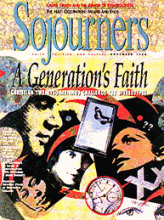God is working God’s purpose out/As year succeeds to year
God is working God’s purpose out/And the time is drawing near
Nearer and nearer draws the time/The time that shall surely be
When the earth shall be filled with the glory of God
As the waters cover the sea
So runs a triumphant hymn of the last century—edited with a touch of inclusive language! It strikes a fitting note for our last reflections before Advent, the season of watching and waiting and expecting.
"Lord, will you at this time restore the kingdom?" Somehow we human beings have never got the point. God has done God’s work. Created a good creation. Created human beings with freedom to choose. Lived out before us the Way. Still we come to the end of each liturgical year gazing up into heaven.
The patient God still waits.
These scriptures call us to ponder how God acts, the God whose coming we await at Advent.
November 6
From This World to the Next
Ruth 3:1-5; 4:13-17; Psalm 42; Hebrews 9:24-28; Mark 12:38-44
The Hebrew scriptures for this week deal with this world—living and dying and all the problems caused by living and dying, leaving one’s home and returning to it, the ties that bind, and new possibilities for life. It is this world to which they attend; in this world God works God’s purposes out with faithful people.
The lesson from the Hebrew scriptures is the lovely story of two remarkable women—Ruth and Naomi. These two brief excerpts set the stage of Naomi’s misfortunes and the birth of her grandson, Obed, the father of Jesse, the father of David.
Read the Full Article
